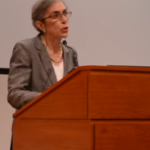DePaul Bans Campus Speaker

Editor’s Note: This piece was originally published on the Academe Blog.
DePaul University has banned conservative pundit Ben Shapiro from speaking on campus to the Young Americans for Freedom student group. Bob Janis, Vice President of Facilities Operations at DePaul, sent an email declaring, “Given the experiences and security concerns that some other schools have had with Ben Shapiro speaking on their campuses, DePaul cannot agree to allow him to speak on our campus at this time.”
This is a classic example of the heckler’s veto, and it must be rejected by everyone. No college campus should ever ban a speaker. Period. No exceptions. If there are security concerns, then you provide the security needed to protect free speech.
In May, leftist protesters disrupted and ended a speech by Milo Yiannopoulos at DePaul (the College Republicans were forced to pay $1000 for campus security, who then did nothing to stop the disruption).
President Dennis Holtschneider apologized to the College Republicans: “They deserved to hear their speaker uninterrupted, and were denied that.” In response, the DePaul University Black Leadership Coalition held a sit-in, leading Holtschneider to apologize to them on June 2, “I am deeply sorry for the harm that was unleashed by a speaker whose intent was to ignite racial tension and demean those most marginalized, both in our society and at DePaul.” Holtschneider then announced his resignation in mid-June, effective at the end of the 2016-17 academic year.
I am no fan of Ben Shapiro, since I critiqued his first book in 2005 and criticized his homophobic views in 2013. But I absolutely defend his right to express his dumb ideas, and the right of student groups to invite him and hear what he has to say.
No one in DePaul’s administration responded to my request for comment on this case.
But I have some unsolicited advice for what DePaul University should do:
1) Revoke the ban on Ben Shapiro and declare that no one is banned from speaking at their campus.
2) Provide adequate security for all campus events, at no cost to the organizers. It should be a campus policy that no one can be forced to pay for being the victim of a crime or a threat.
3) Reform its campus code to provide greater protection for free speech, and to clearly specify that silencing speakers is a violation of those rules.
4) Educate the campus community about why free speech and open debate of ideas is important.




